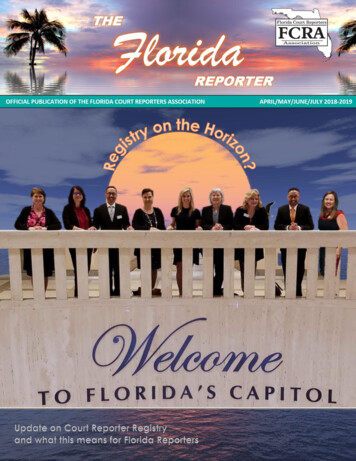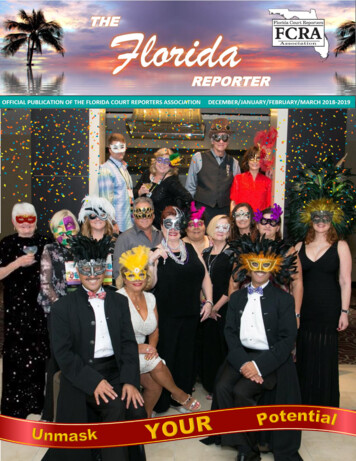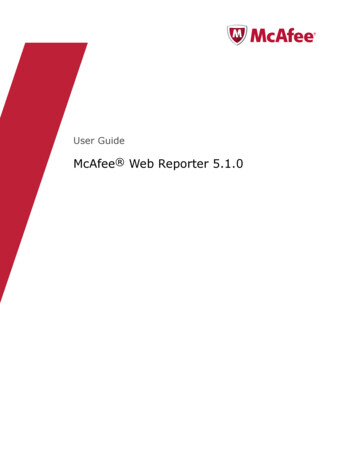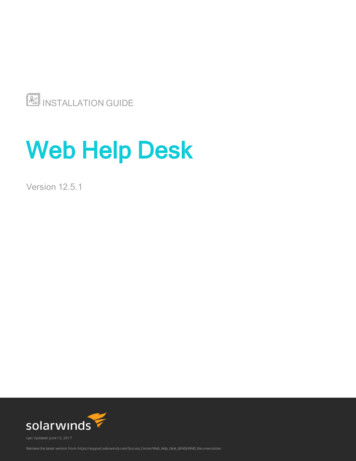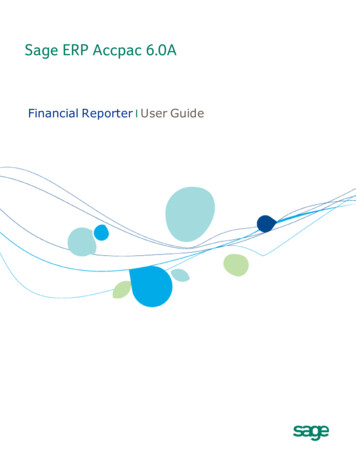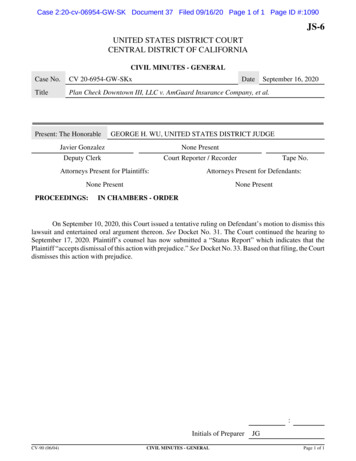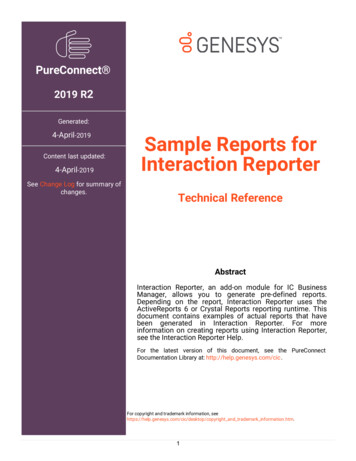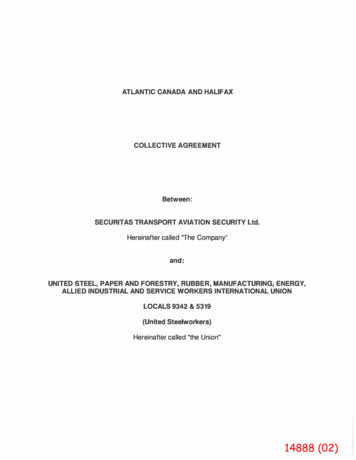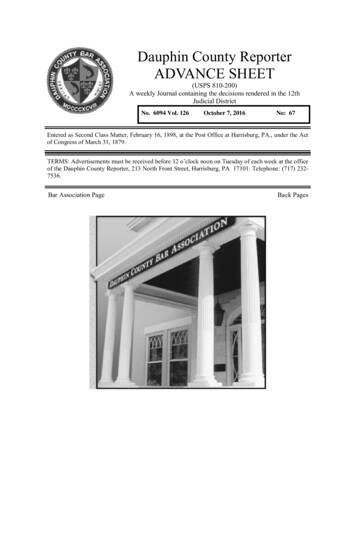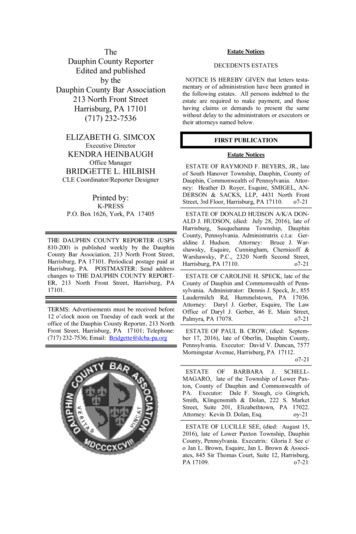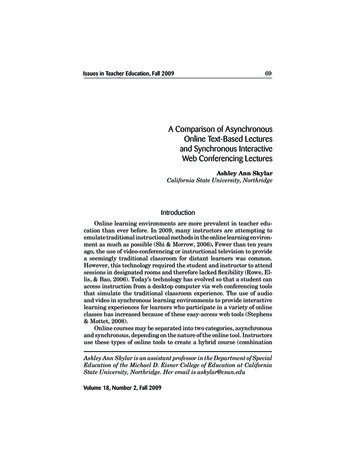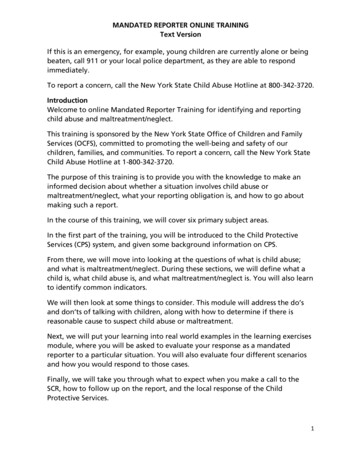
Transcription
MANDATED REPORTER ONLINE TRAININGText VersionIf this is an emergency, for example, young children are currently alone or beingbeaten, call 911 or your local police department, as they are able to respondimmediately.To report a concern, call the New York State Child Abuse Hotline at 800-342-3720.IntroductionWelcome to online Mandated Reporter Training for identifying and reportingchild abuse and maltreatment/neglect.This training is sponsored by the New York State Office of Children and FamilyServices (OCFS), committed to promoting the well-being and safety of ourchildren, families, and communities. To report a concern, call the New York StateChild Abuse Hotline at 1-800-342-3720.The purpose of this training is to provide you with the knowledge to make aninformed decision about whether a situation involves child abuse ormaltreatment/neglect, what your reporting obligation is, and how to go aboutmaking such a report.In the course of this training, we will cover six primary subject areas.In the first part of the training, you will be introduced to the Child ProtectiveServices (CPS) system, and given some background information on CPS.From there, we will move into looking at the questions of what is child abuse;and what is maltreatment/neglect. During these sections, we will define what achild is, what child abuse is, and what maltreatment/neglect is. You will also learnto identify common indicators.We will then look at some things to consider. This module will address the do’sand don’ts of talking with children, along with how to determine if there isreasonable cause to suspect child abuse or maltreatment.Next, we will put your learning into real world examples in the learning exercisesmodule, where you will be asked to evaluate your response as a mandatedreporter to a particular situation. You will also evaluate four different scenariosand how you would respond to those cases.Finally, we will take you through what to expect when you make a call to theSCR, how to follow up on the report, and the local response of the ChildProtective Services.1
MANDATED REPORTER ONLINE TRAININGText VersionThere are four main objectives that will be covered during this training:1. Effectively report child abuse or maltreatment/neglect to the New YorkStatewide Central Registry (SCR) of Child Abuse and Maltreatment, alsoknown as the Child Abuse Hotline;2. Evaluate situations to determine whether you have reasonable cause tosuspect child abuse or maltreatment/neglect;3. Identify the physical and behavioral indicators commonly associated withchild abuse and maltreatment/neglect;4. And describe the legal framework for the New York State Child ProtectiveServices.A national study conducted in the 1980s concluded that many professionals donot report abuse and maltreatment/neglect because of two factors. The first is ageneral confusion or misunderstanding about the reporting laws and procedures.And the second is the lack of knowledge or awareness of warning signs and clues.Furthermore, in 1999, the University of Rochester conducted research for acampaign to increase community involvement to prevent child abuse andmaltreatment/neglect, and improve reporting.Mandated reporters were included as a group in this study, and they disclosedtwo main reasons for why they did not fulfill their legal obligation to report.First, they were not clear about abuse or maltreatment/neglect as defined by NewYork State law. And second, they were often improperly influenced by theirprofessional beliefs, values, and experiences. Do not apply your own beliefs, values, or personal experiences; Do act on the facts and your professional experience when measuring howto respond to a concern.As a result of these and other studies, we know that child abuse andmaltreatment/neglect are under-reported, and that conversely, some situationsthat are reported to the SCR are more suitable for preventive services or otherresources.The following video transcript illustrates how the CPS system works to supportfamilies through crisis and stress in their lives. Working with a family to improvetheir lives and break the cycle of abuse and maltreatment/neglect is the purposeof intervention.As you review this transcript, remember that child abuse andmaltreatment/neglect can occur in any family regardless of its education,ethnicity, or socio-economic class. The family in this video faced many difficult2
MANDATED REPORTER ONLINE TRAININGText Versionchallenges. Once CPS was involved, Philomena’s life, and her children’s lives,turned around.[Start of Transcript][Setting: Philomena’s kitchen][Male Narrator] Philomena Allen wanted her daughters to have a differentchildhood than the one she and her mother had.[Philomena] My mother’s mother was not a very good parent. She had addictionsof her own. It wasn’t drugs at that time, but it was other things. Some significantthings that my grandmother has done, my mother has done it, and I have done it.[Setting: Workplace conference room][Male Narrator] Mary Ann Sangarten (MSW, CSWR) counsels families caught inthe cycle of neglect and abuse, a cycle that begins when a child’s plight isignored.[Mary Ann Sangarten, Case Worker] I’ve worked with so many adults who havetalked about telling people and nobody helping them, and being so hopeless andhelpless about the situation that they can’t relate very well as adults. They haveproblems in their relationships, they have problems relating to their children,makes their children vulnerable to abuse by other people. So it’s a cycle thatkeeps going and going.[Male Narrator] Philomena was 10 when she left her mother’s home. She had herfirst daughter at 16. By the time she was 25, she had three more daughters and aserious drug addiction.[Philomena] I left my kids with a family and I was just in the streets, and usingdrugs. The family that they were living with was not all that great, but it wasbetter than me. It was better than what I was doing, so I left them there.[Male Narrator] Having abandoned her four daughters, six years later, she foundherself pregnant again, and in jail.[Mary Ann Sangarten, Case Worker] I don’t think most parents want to hurt theirchildren, and they often regret that they’ve hurt them, whether that’s physically,sexually, emotionally. They are not able to stop themselves, so it takes anintervention by an outside source, to go in and say, “Wait a minute. We need tobe really taking a look at how things are going and what’s happening here.”3
MANDATED REPORTER ONLINE TRAININGText Version[Philomena] You wouldn’t think that you’d get better when you go to jail, butthat’s when things started getting better for me. I realized that whether I wasgoing to straighten up my life, or ever do whatever, get my kids back, orwhatever, I still had an obligation to make sure this baby was not born addictedto drugs.[Setting: Interior of a church][Male Narrator]While in jail, Philomena met Father Tony and developed arelationship that has continued to this day.[Philomena] When I got out, I went to a woman’s shelter. And it was actually onthe same grounds as Saint Richard’s Church. It was Bethany House. And thingshappened from there. I formed a relationship with my kids. I had my baby.[Male Narrator] She got herself off drugs, got her daughters back, and began thedifficult process of pulling her family together.[Elizabeth, Philomena’s teenage daughter] When my mom came to get me, it waslike, a big relief, because I was scared. It was like, I was lost, and I blame that on,that’s why I have so many issues.[Olivia, Philomena’s teenage daughter] We try not to let it get in the way, butdeep down inside, it makes a difference. Life would have been better if shewouldn’t have left us, and I don’t see how she could abandon her kids for drugs.[Philomena] I won’t even say I’ve forgiven myself to this day. But just recently I’vebeen able to, when they say to me, “Well you should’ve been there!” I can nowsay, “Well I’m here now.” I couldn’t say that. I couldn’t say that for a long, longtime. It’s been nine years. In December I have nine years clean, but I could notsay that until, maybe in just the last six months. I blame myself, and I cried, and Ihated myself for what I did to them.[Male Narrator] With support from her parish, and a challenge from her ChildProtective worker, Philomena turned her life around.[Setting: Interior of Philomena’s house][Philomena] She really helped me to see what I was doing, what was going onwith me, to have led me to the drugs, and what led me to come home and getmy kids. Her main focus was to help me help me, and she did.[Setting: Philomena’s work area]4
MANDATED REPORTER ONLINE TRAININGText Version[Philomena, speaking to a client] And then in two months, here comes the baby.[Male Narrator] Philomena now works for a social services agency, sharing herexperiences and knowledge with other families, helping to spin their lives in anew direction.[Female Client of Philomena’s] She came into my life at a time when I was havinga lot of problems with my daughter, through courts and stuff like that. If I gotmad at the judge or something, I felt like they were treating me wrong, I couldtalk to her, and she would tell me she went through the same thing, and tell mehow to more or less handle it a little better, how she did it, and it really workedfor me. She was just really there, (telling me) “You know you can call me athome, you can call me at my job. You need anything, you know, a cab orwhatever.” Anything that I needed, I called her, and she was always there. She isa wonderful person.[Chuck Allan, Philomena’s supervisor] Philomena spends her time supporting andmeeting and helping the families that come our way. So she’s a remarkablesuccess story, but knows what it’s like to be on the other side of the table.[Setting: Interior of Philomena’s home, looking at framed pictures of her kids ona wall][Philomena] I like the look at what they looked like when they were little. Itmeans a lot to me to have these pictures.[Male Narrator] Philomena has been clean for nine years. Elizabeth and Olivia, 1and 2 when she left them, are now 15 and 16. Benna, her youngest, is 8. Theoldest daughters, Rhonda and Renee, are living on their own, but on Sundays,you often see them all together.[Elizabeth] We all love each other unconditionally. There is no more to say.[End of Transcript]The video clearly demonstrates that CPS intervention into a family’s life can bepositive. It can provide stability, and a structure for change. Remember thatsometimes, intervention can provide exactly the kind of help a family needs toprevent further abuse or maltreatment/neglect from causing irreversible harm.Remember, whether or not you believe the parents or other person’s legallyresponsible for the child will be open to intervention, you are still obligated tomake the report to the SCR. And in some cases, a report to the SCR is often the5
MANDATED REPORTER ONLINE TRAININGText Versionwake-up call a parent needs to get help in areas of their life that have becomeunmanageable.Module 1: Background of the CPS SystemIn this module, you will learn about the following: The Child Protective Services Act of 1973; Statistics on registered reports in the state of New York; The role of the mandated reporter; The legal framework for protections and guidance to support themandated reporter including immunity from liability, confidentiality, andpenalties for failure to report; And finally, requirements for complying with requests for records fromCPS.Background of the Child Protective Services SystemThe Child Protective Services Act was passed in 1973. The law required mandatoryreporting of suspected child abuse or maltreatment by specific professionals.Please take a moment to review this list of mandated reporters:Physician; Registered physician assistant; Surgeon; Medical examiner; Coroner;Dentist; Dental hygienist; Osteopath; Optometrist; Chiropractor; Resident;Intern; Registered nurse; Emergency medical technician; Psychologist;Podiatrist; Licensed creative arts therapist; Licensed marriage & familytherapist; Licensed mental health counselor; Licensed psychoanalyst; Licensedbehavior analyst; Certified behavior analyst assistant; Christian Sciencepractitioner; Hospital personnel engaged in the admission, examination, care,or treatment of persons; Social services worker; Day care center worker; Mentalhealth professional; All persons credentialed by the New York State Office ofAlcoholism and Substance Abuse Services; Social worker; Director of children’sovernight camp, summer day camp, or traveling summer day camp; School agechild care worker; Employee or volunteer in a residential care facility; Childcare or foster care worker; Provider of family or group family day care; Peaceofficer; Police officer; District attorney; Assistant district attorney; Investigatoremployed in the office of a district attorney; Any other law enforcementofficial; Alcoholism counselor; Substance abuse counselor; School official,which includes but is not limited to: School teacher, School guidance counselor,School psychologist, School social worker, School nurse, School administrator,Other school personnel required to hold a teaching or administrative license orcertificateThe list changes as legislation is updated. The complete list of mandatedreporters is available at this link:http://ocfs.ny.gov/main/cps/faqs mandatedreporter.asp6
MANDATED REPORTER ONLINE TRAININGText VersionFurther, this law called for the creation of a 24-hour, 7-day-a-week centralregistry, known in New York as the Statewide Central Register (SCR), to receivereports. The SCR is operated by the New York State Office of Children and FamilyServices, or OCFS.The law also called for the establishment of local Child Protective Services, or CPS,to receive and investigate registered reports. In New York, local districts CPSoffices are staffed by human services professionals trained to investigateallegations of child abuse and maltreatment.Reminder: the terms maltreatment and neglect are often used interchangeably.Both terms have legal foundation in the CPS system. Maltreatment is the termused in the Social Services Law, and neglect is the term used in the Family CourtAct. For the remainder of this training, we will use maltreatment to refer to bothmaltreatment and neglect.Reports RegisteredThe most recent data from OCFS shows that of all the registered reports made inNew York State last year, the majority were made by mandated reporters, whichshould come as no surprise. A mandated reporter’s training and professionalawareness of the common indicators of child abuse and maltreatment are justtwo reasons they result in more complete and frequent reporting.Role of the Mandated ReporterSection 413 of the Socials Services Law requires: Designated professionals to report to the SCR when they havereasonable cause to suspect that a child before them in their professionalcapacity has been abused or maltreated Mandated reporters must also report if there is reasonable cause tosuspect that there is an abused or maltreated child where the parent,guardian, or custodian comes before the reporter in their professionalcapacity and states from personal knowledge, facts, or conditions thatrender that child in a harmful situation Reports need to be made to SCR immediately upon the development ofreasonable cause to suspect child abuse or maltreatment. Please be aware that inthe state of New York, you, as an individual, own the responsibility to report tothe SCR, regardless of any protocols that are established in your organization.Legal Framework7
MANDATED REPORTER ONLINE TRAININGText VersionMandated reporters have a legal obligation to report. But there is also aframework of protections and guidance to support them.There are three main components to the legal framework that apply tomandated reporters. They are:1. Immunity from liability;2. Confidentiality;3. And penalties for failure to report.Immunity from Liability: Some mandated reporters face a conflict between theirlegal obligation to report and their legal obligation to maintain client or patientconfidentiality. Section 419 of the Social Services Law provides immunity fromliability for mandated reporters.Mandated reporters are immune to any criminal or civil liability if the report wasmade in good faith. The good faith of an individual, official, or institutionrequired to report, is presumed. Therefore, any person accusing you of making afalse report in bad faith must prove you acted with gross negligence or willfulmisconduct.No conditions, prior approvals, or prior notification requirements may be placedon mandated reporters relating to calling in reports to the SCR.Any retaliatory personnel action against any employee who makes a report to theSCR is in violation of the law and is not permitted. Section 740 of the Labor Lawdefines retaliatory personnel action as discharge, suspension, demotion, or anyother adverse employment action involving the terms or conditions ofemployment.The informational letter on this subject is available using this S laces%2007-OCFS-INF-07).pdfConfidentiality: New York State law provides confidentiality to those who make areport. Neither the Office of Children and Family Services, nor the local ChildProtective Services, are permitted to the release to the subject of the report anydata that would identify the source of the report, unless the reporter has givenwritten permission for OCFS or CPS to do so. Information regarding the source ofa report may be shared by OCFS or local CPS with certain individuals, includingthe court, police, or district attorney, but only as provided by law.8
MANDATED REPORTER ONLINE TRAININGText VersionPenalties for Failure to Report: Mandated reporters are subject to seriousconsequences for failure to report. A mandated reporter who fails to report canbe found guilty of a Class A misdemeanor. The penalty for a Class A misdemeanorcould be up to a year in jail, a fine of up to 1000, or both. In addition to thesecriminal penalties, failing to report may result in a lawsuit in civil court formonetary damages for any harm caused by the mandated reporter’s failure tomake the report to the SCR, including wrongful death suits.Mandated Reporter RecordsBeginning in 2005, an amendment to the Social Services Law 415 requires thatmandated reporters who make a report to the SCR comply with all requests forrecords by CPS relating to the report they filed.The mandated reporter to whom the request is directed makes the determinationof what information is essential. If CPS believes that the mandated reporter hasadditional essential information pertaining to the report, CPS should ask themandated reporter for the additional records, and attempt to come toagreement regarding any additional records.If CPS and the reporter cannot come to an agreement, and CPS disagrees with themandated reporter’s rationale for why the records are not relevant to the report,CPS may seek a court order, pursuant to Civil Practice Law Rules Article 31 andSocial Services Law 415, directing the mandated reporter to produce the essentialinformation.The amendment to the law only applies to the records of the mandated reporterwho made the report of suspected abuse or maltreatment. Additionally, therecords that CPS requests should be limited only to information that directlypertains to the report itself.The purpose of the inclusion of these records is to support a full investigation ofallegations of child abuse or maltreatment. This language is not intended to bean expansion of a mandated reporter’s current obligation.Since the passage of the federal HIPAA (Health Insurance Portability andAccountability Act), confusion has arisen regarding the obligation of a mandatedreporter to provid
MANDATED REPORTER ONLINE TRAINING Text Version 1 If this is an emergency, for example, young children are currently alone or being beaten, call 911 or your local police department, as they are abl

